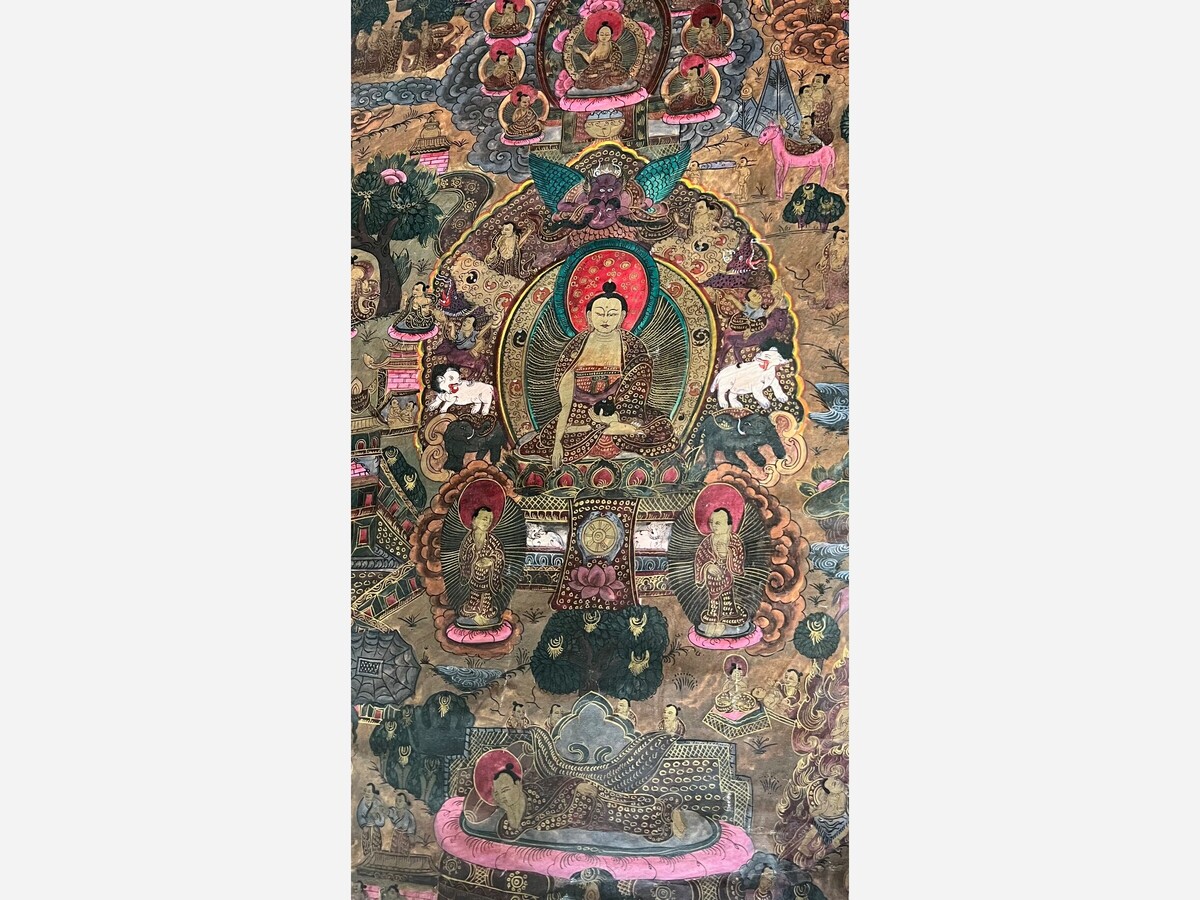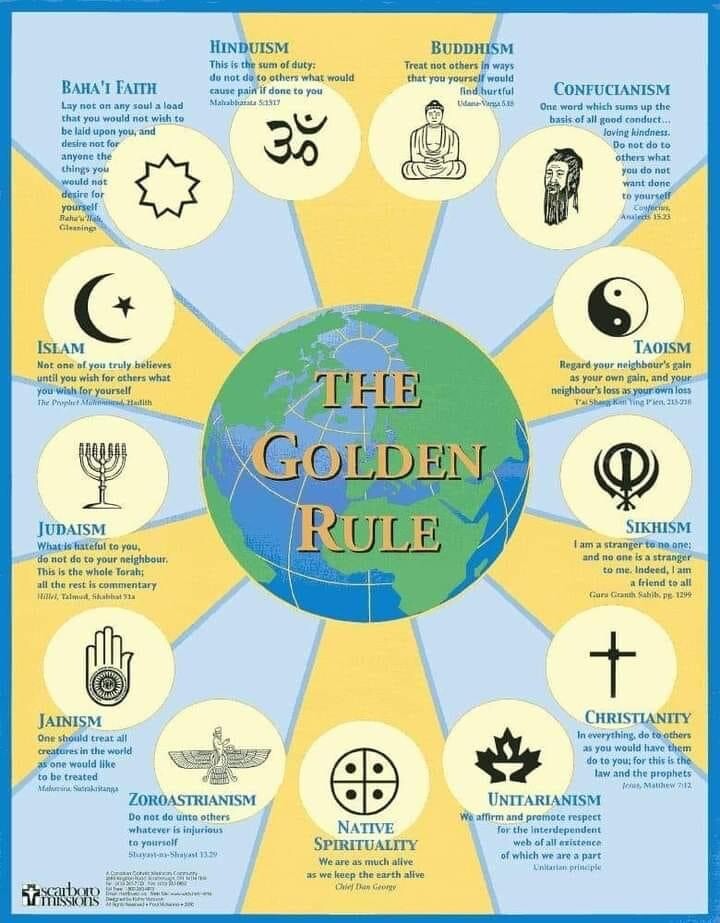Image


by Sandra Williams*
I have always been interested in world religions, what they teach and what I may find to be essential, common tenets across the spectrum. Of course, everyone must find his/her own way in faith and matters of spirituality (or not). I am not a Buddhist, or a scholar in world religions and am not evangelizing for Buddhism here. However, I wanted to share what I have found of value in its Noble Eightfold Path, which can foster a more conscious way of living and may even support other religious faiths, if one so chooses.
The Eightfold Path was thought to be revealed in the first sermon of the founder of Buddhism, Siddhartha Gautama (563 to 483 B.C), known as the Buddha, who achieved “enlightenment” after meditating for 49 days under a Bodhi tree. Buddha did not claim to be a god, and is not considered a god to his followers. He was a teacher who shared his experience and insights and a way to achieve enlightenment.

For me, the eight tenets of this path embody ideals to aspire to in order to be more mindful of how we live and how we relate to other human beings. The following is a paraphrased/simplified description of each from https://en.wikipedia.org/wiki/Noble_Eightfold_Path#
These are questions I had when I first looked into the Eightfold Path:
1. What would it mean to be aware of and follow each one of these tenets, for myself and for others? 2. What would it mean for me and for others if we do not follow them? These, and other questions may be pondered from time to time to “check in” if one is being true to these ideals. So that all this isn’t too abstract, I share an example of checking in for Right Speech, which to me implies written communication as well
.
* What is the purpose of my speaking?
* Is it necessary or helpful that I say/write it?
* Will its purpose be understood?
* Am I too impulsive in what, how and why I am communicating?
* How can I speak in the most essential, concise and clear way and not just for small talk, gossip, digressing, or rambling?
* Do I need to say everything I am thinking? (usually not)
* Is there an element in my communication of “one-upmanship,”or a subtle unhelpful, sarcastic tone?
* Am I speaking just to prove I am right about something, rather than speaking objectively with facts and logic, and/or noting that it is subjective (my experience and opinion only).
These questions may seem excessive or obsessive; however, for one following Buddhism, they are no different from other ways people attempt to adhere to their faiths. I have been drawn to the Eightfold Path, see its value, but, no doubt, fall short and “forget to remember” to check in, but there is always “try and try again!”
Buddhists may have much to say about my calling the Eightfold Path “ideals” or cherry-picking this aspect of Buddhism, as there is a much greater understanding to be grasped and followed if one were to consider oneself a Buddhist, though the Eightfold Path is central to any of its branches, and in some ways, is common sense for everyday life, or a lifetime, no matter if one has a spiritual path or not. To me, it is what matters.
* Sandra Williams is a writer of poetry, fiction and essays. She believes writing is both therapeutic and enlightening: “When we become aware of what inspires us, our imagination is expanded, and we tap into our intuitive selves.” She and her husband, Robert, local landscape and mural painter live in Gilbertsville, PA and part-time in Rockport, MA. She is author of Moss on Stone: an historical novella and Time and Tide: a collection of tales (available on Amazon). Other writings at www.cosmicseanotes.blogspot.com
****
Ed. In a later post, Sandra shared the following passage from Vivekananda* on the idea of "Universal Religion" as she looked forward to attending the Annual Vivekananda Worship Service with the Vedanta Society of Providence in Annisquam, MA.
What are the beliefs of Vedanta Society? Pure, perfect, free from limitations, the Atman (the individual soul) , Vedanta declares, is one with Brahman (God). The greatest temple of God lies within the human heart. Vedanta asserts that the goal of life is to realize and to manifest our own divinity. This divinity is our real nature, and the realization of it is our birthright.
If there is ever to be a universal religion,
it must be one… whose sun will shine upon
the followers of Krishna and of Christ,
on saints and sinners alike;
which will not be Brahminic or Buddhistic,
Christian or Mohammedan,
but the sum total of all these,
and still have infinite space for development;
which in its catholicity will embrace in its infinite arms
and find a place for every human being…
It will be a religion which will have no place
for persecution or intolerance in its polity,
which will recognize divinity in every man and woman,
and whose whole scope… will be centered
in aiding humanity to realize its own true, divine nature.
-Swami Vivekananda
*In 1893, Swami Vivekananda started his journey from India to attend the Parliament of Religions in Chicago and share his perspectives as a Hindu. When he arrived in Chicago, officials denied him entrance, saying he did not have the proper credentials. Finding Chicago expensive, Vivekananda traveled by train to Boston. On the way, he met Kate Sanborn. She eagerly contacted friends and colleagues to help Swami Vivekananda attend the Parliament. One was John Henry Wright, a Harvard professor, who was pleased to meet the articulate, erudite monk. Wright invited Swami Vivekananda to Cape Ann, where the professor spent time in summer. It was here on Sunday, August 27, 1893, at the Annisquam Village Church, that Swamiji made his first public address to speak on the customs and life in India.
